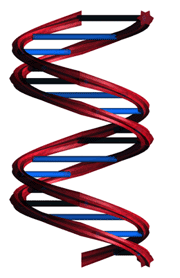| ICAM INSTITUTE FOR COMPLEX ADAPTIVE MATTER Rutgers University Branch Campus |
|
| ICAM Home |
I2CAM |
Condensed
Matter (Th, Expt) |
Chemistry
|
Biomaps
|

The New Brunswick campus of Rutgers University is a founding member of the "Institute for Complex Adaptive Matter" or ICAM. ICAM is an "Institute without Walls" : an organization devoted to the understanding and research into the principles that govern collective behavior in matter - ranging from cold quantum matter, soft condensed matter, to biological matter. Key members of the Rutgers ICAM team are
in the Condensed Matter group, the Biomaps research institute and the department of Chemistry and Chemical Biology. All members of these groups are eligible for participation in ICAM and I2CAM activities, including the submission of proposals for grants and workshops.
Chromatin Dynamics Workshop, co-organized by Anirvan Sengupta, summer 2006.
There are some 27 or so branch campuses of ICAM, including branches in Europe in Paris, Karlsruhe, Trieste and Dresden, Asian branches at the ISSP Tokyo, and at Kyoto, and and several new campuses on the way. ICAM has just been awarded a significant five year International Materials Institute award from the NSF (I2CAM) to which enables travel, research, workshops and summer schools to be organized with overseas branch campuses. Rutgers is strongly encouraged to participate.
It is generally acknowledged that many of the key challenges and opportunities in the study of matter involve understanding complex and collective phenomena. Because these challenges frequently fall at the boundaries between conventional scientific disciplines, there is an urgent need to create new kinds of thinking and institutions capable of exploiting these opportunities. At the core of this new enterprise in the study of matter is the search for an understanding of emergent behavior – phenomena whose ultimate cause involves interactions between many simple units but which cannot be easily predicted from knowledge of the component parts alone. Our shorthand designation for soft, hard, and living matter exhibiting emergent phenomena is complex adaptive matter.
- Proposals for innovative workshops. ICAM and its
international
branch, I2CAM runs four or five workshops worldwide each year. Funds
are available at relatively short notice for innovative research
workshops, particularly those that encourage cross-disciplinary
research and outreach . Past workshops organized by Rutgers
Faculty include "Quantum
Criticality" (New York, 2003) and "Frontiers in Correlated
Matter" (Aspen, Snowmass 2004)
- ICAM postdoctoral and senior fellowships. As many as eight competitive senior and postdoctoral fellowships, are available each year to link research between ICAM member branches. The awards, up to $25,000 per year are intended to catalyze research and research collaborations on complex adaptive matter, by supplementing existing postdoctoral appointments or sabbatical leave support, and providing travel expenses for inter-institutional research collaborations.
- I2CAM Junior Fellowships. I2CAM is the NSF funded international materials research institute of ICAM. I2CAM offers 60 international fellowships available between US ICAM branches and their foriegn counterparts. These fellowships cover travel costs for up to 6 months for junior (non-faculty) researchers and can be applied for with a minimum amount of bureacracy online.
- I2CAM junior travel awards which are available to junior researchers, for one or two week international travel to other international ICAM branches or to ICAM sponsored workshops.
- The I2CAM summer school in Cargese, held each summer at Corsica on alternating themes of hard, soft and biological matter. 2005 school: "Strongly Correlated Electrons: Diverse Examples and Unifying Themes". 2006 school: "Physics of Cellular Objects".


